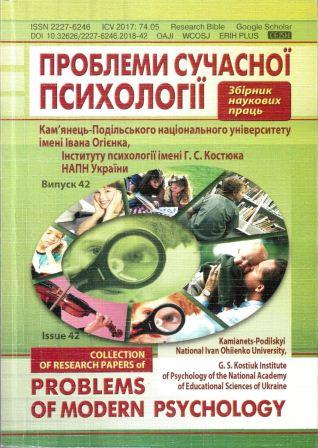Social Intelligence in the Paradigm of Cognitive Psychology: the Results of Study
DOI:
https://doi.org/10.32626/2227-6246.2018-42.50-69Ключові слова:
соціальний інтелект, когніції, метакогніції, метаінтелектуальна активність, технічний інтелект, мистецький інтелект, інформаційний інтелект.Анотація
The article states that social intelligence in psychology is seen as the ability of a person to understand correctly his / her own behavior and the behavior of other people in the society. This ability is very necessary for a person to have an effective interpersonal interaction and successful social adaptation. Social intelligence implements the functioning of cognitive processes associated with the reflection of a person as a partner in the processes of communication and activities. The main function of social intelligence is to predict the behavior of others. The authors of the article consider the concept of «intelligence» in the broad and narrow senses. In a broad meaning of «intelligence» it is only one intelligence, the intellectual sphere of the person in general. In this sense, the intelligence of a person can be described as a hierarchical system that has several levels. The first level is the level of functioning of cognitions. The second level of intelligence is the level of metacognitions. The third level of intelligence amplifies the characteristics of both the first and the second levels, while intellectual activity is carried out mainly at an unconscious level, the level that approximates a person to use of automated skills and abilities. The next, the fourth level, is the level of meta-intellectual activity, which explodes the creative achievements of the person. It was proved that each type of intelligence contained some abilities of the person to perform a certain type of the activity. Guided by the narrow sense of understanding the word «intelligence», it was determined: social intelligence; technical intelligence; artistic intelligence; information intelligence. It was described the empirical research which was organized in different regions of Ukraine (the participants of this research were teachers and directors from preschool educational establishments). The results having been received in this research proved that the respondents of all groups had the results which showed the advantage of average indicators of their ability to understand the meanings of non-verbal expressions and the meaning of the expression, depending on a social context. This may be due to the fact that these abilities are formed in the immediate process of communication and to a large extent depend on the conditions of the life of the subjects, at the first place – on the conditions of their professional activity, means and methods of professional activity of teachers of preschool educational establishments.Посилання
Балл Г.О., Мєдінцев В.О. Особистість як індивідуальний модус культури і як інтегративна якість особи. Горизонти освіти. 2011. № 3. С. 7–14.
Засєкіна Л.В. Структурно-функціональна організація інтелекту особистості : автореф. дис. … д-ра психол. наук : 19.00.01. К., 2006. 34 с.
Смульсон М.Л. Психологія розвитку інтелекту. К. : Нора-друк, 2003. 298 с.
Фёдорова Е.А. Социальный интеллект как фактор формирования отношения к социально значимым объектам у представителей различных этнических групп : дисс. канд. … психол. наук : 19.00.05. Ярославль, 2009. 307 с.
Carlston, D.E. (1994). Associated systems theory. A systematic approach to the cognitive representation of persons and events. Vol. 7 : Associated Systems Theory. Hillsdale, N-Y : Erlbaum. Р. 1–78.
Collins, M.X. (2014). Information Density and Dependency Length as Complementary Cognitive Models. Journal of Psycholinguistic Research, 43, Issue 5, October, 651–681.
Fiske, S.T., & Taylor, S.E. (1991). Social Cognition. New York : McGrawHill, 156 p.
Gardner, H.E. (1993). Multiple intelligences: the theory in practice. N-Y. : Basic Books, 463 p.
Guilford, J.P. (1956). The structure of intellect. N.-Y. : Psychol Bull,
p. 63–99.
Sherman, S.J., Judd, С.М., & Park, B. (1989). Social Cognition. Annu. Rev. Psychol., 40, 281–326.
Hilton, J.L., & von Hippel, W. (1996). Stereotypes. Annu. Rev. Psychol., 47, 237–271.
Kihlstrom, J.F., & Cantor, N. (2013). Social Intelligence. Retrieved from http://istsocrates.berkeley.edu/~kihlstrom/social_intelligence.htm.
Sternberg, R.J., & Smith, H.G. (1985). Social intelligence and decoding skills in nonverbal communication. Social Cognition, 3, 168–192.
Tillman, R., & Louwerse, M. (2018). Estimating Emotions Through Language Statistics and Embodied Cognition. Journal of Psycholinguistic Research, 47, Issue 1, February, 125–138.
##submission.downloads##
Опубліковано
Як цитувати
Номер
Розділ
Ліцензія
Редакція має повне право публікувати у Збірнику оригінальні наукові статті як результати теоретичних і експериментальних досліджень, які не знаходяться на розгляді для опублікування в інших виданнях. Автор передає редколегії Збірника права на розповсюдження електронної версії статті, а також електронної версії англомовного перекладу статті (для статей українською та російською мовою) через будь-які електронні засоби (розміщення на офіційному web-сайті Збірника, в електронних базах даних, репозитаріях та ін).
Автор публікації зберігає за собою право без узгодження з редколегією та засновниками використовувати матеріали статті: а) частково чи повністю в освітніх цілях; б) для написання власних дисертацій; в) для підготовки абстрактів, доповідей конференцій та презентацій.
Автор публікації має право розміщувати електронні копії статті (у тому числі кінцеву електронну версію, завантажену з офіційного web-сайту Збірника) на:
- персональних web-ресурсах усіх Авторів (web-сайти, web-сторінки, блоги тощо);
- web-ресурсах установ, де працюють Автори (включно з електронними інституційними репозитаріями);
- некомерційних web-ресурсах відкритого доступу (наприклад, arXiv.org).
Але в усіх випадках обов’язковою є наявність бібліографічного посилання на статтю або гіперпосилання на її електронну копію, що містяться на офіційному сайті Збірника.







